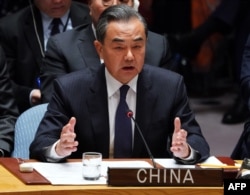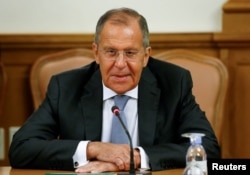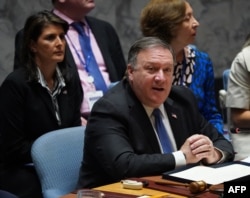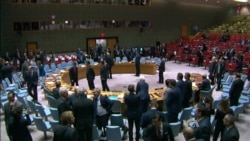Russia and China called Thursday for international sanctions to be eased on North Korea as an incentive for it to denuclearize. The call is seen by the West as jeopardizing the international consensus on pressuring Pyongyang.
"China firmly believes that pressure is not the end," Chinese Foreign Minister Wang Yi told a high-level meeting of the U.N. Security Council on North Korea. "Both implementing sanctions and promoting political settlement are equally important under Security Council resolutions."
Wang urged the 15-member council to consider using a provision in its resolutions that allows for modifying sanctions.
"Given the positive developments in inter-Korean and the DPRK-U.S. relations and the DPRK's important pledges and actions on denuclearization, China believes that the Security Council needs to consider invoking, in due course, this provision to encourage the DPRK and other relevant parties to move denuclearization further ahead," Wang said. DPRK is the abbreviation for North Korea's formal name.
Russia's foreign minister seconded the Chinese proposal.
"Steps by the DPRK toward gradual disarmament should be followed by easing of sanctions," Sergey Lavrov told council members. He said Western calls for maintaining pressure on North Korea seemed "inappropriate and untimely" given that Pyongyang had taken "important steps toward denuclearization."
Lavrov said the Security Council should send a "positive signal" to the North and asked why some council members "stubbornly" refused to do so. He said Russia is ready to draft a council resolution supporting the positive momentum around the Korean Peninsula.
US response
Their position is opposite of the United States and most Western countries, which seek to maintain a policy of maximum pressure on Pyongyang until it fully denuclearizes.
"We must not forget what brought us this far: the historic international pressure campaign that this council has made possible through the sanctions that it imposed," said U.S. Secretary of State Mike Pompeo, who chaired the council meeting. The United States holds the council's rotating presidency this month.
"Until the final denuclearization of the DPRK is achieved and fully verified, it is our solemn collective responsibility to fully implement all U.N. Security Council resolutions pertaining to North Korea," Pompeo said.
Since North Korea conducted its first nuclear test in 2006, the U.N. Security Council has imposed several rounds of increasingly tough targeted sanctions to choke off funding to Pyongyang's nuclear and ballistic missile programs. Until now, the council has been united in its approach, but the call to ease sanctions by Beijing and Moscow could signal an end to the council's unity and ability to pressure North Korea going forward.
Pompeo said he met Wednesday with his North Korean counterpart Ri Yong Ho to discuss how to move forward on commitments made at the June Singapore summit between President Donald Trump and Chairman Kim Jong Un. He said they also discussed a second summit between the two leaders. Pompeo said he plans to go to Pyongyang next month for more discussions.
WATCH: Russia, China Clash With US Over North Korea Sanctions
Illegal transfers
The United States has accused Russia of "consistent and wide-ranging" violations of the sanctions imposed on North Korea. Specifically, Washington says it has evidence of illicit ship-to-ship transfers of banned items, mainly oil, but increasingly coal and other goods.
Washington said last week it has tracked at least 148 instances this year of oil tankers conducting such illegal transfers of refined petroleum products, netting North Korea more than 800,000 barrels of refined petroleum products. Pyongyang is allowed 500,000 barrels a year under the sanctions.
Also present at the session were the foreign ministers of South Korea and Japan, who both urged international pressure to continue. North Korea did not speak at the meeting, but had diplomats in the room.
Thursday's meeting was held on the sidelines of the annual meeting of world leaders, who are gathered this week at the General Assembly.









